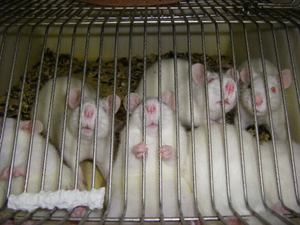It’s only a rat!
Perhaps in my post of 4 July 2017 in which I accuse the tobacco giant Philip Morris International (PMI) of torturing animals I was being a little unjust. I had not at that time seen their proclamation, ‘Our standards for animal testing’.
In this document they reassuringly tell us ‘PMI takes to heart public concerns about animal research’. Note how they deviously say ‘concerns about animal research (in general)’, not concerns about Philip Morris’s animal research. At least animal research as normally understood is done with the hope of finding cures for human ailments, however unscientific and misguided the endeavour of experimenting on non-human species may be.
So why does PMI carry out animal research?
We conduct research to better understand the mechanism by which tobacco smoke-related diseases develop.
Let us indulge for a moment in a little science-fiction fantasy, where at some indefinite time in the future, PMI has somehow managed to gain a perfect understanding of the mechanism by which tobacco smoke-related diseases (presumably they mean all of them) develop, what then? They add, ‘This is important for assessing the aerosol of PMI’s RRPs (reduced-risk products).’
And when they have assessed the aerosol of these products by their repulsive animal experiments, they will no doubt claim that their reduced risk products do, indeed, pose less of a danger to the users thereof than ordinary cigarettes. Never mind that these products are still risky, that animal experiments are of dubious, if any, relevance for humans, and that the only way we’ll know how much less risky, if at all, these products are, will be if people are so misguided as to buy and use them for, say, twenty years – then we’ll know. But by then it may be too late for such willing human guinea pigs.
PMI then parrots the attempted justifications offered by animal experimenters engaged in the usual kind of medical research.
But before we get onto that, it should be noted that whereas conventional medical research is done with the intention of finding cures for afflictions like cancer and heart disease, PMI’s products are indisputably involved in the cause of cancer and heart disease, and other diseases. Therefore, obviously, the best thing PMI and others in the Big Tobacco cartel could do right now, if they were really concerned about public health (don’t laugh), is to stop making cigarettes.
Furthermore, any research that Big Tobacco may sponsor or carry out is obviously likely to be self-serving and for this reason has come to be regarded with suspicion by the medical profession. This is why in 2013 The British Medical Journal and other major medical journals decided they would no longer consider for publication research that is partly or wholly funded by the tobacco industry – and rightly so.
Now let us look at some more of the spurious excuses PMI makes for torturing animals.
…we restrict animal studies to situations where no alternatives are available…If we could do research without any animal studies, we would. At present, we cannot.
How about the alternative of not doing the studies at all? Of course they won’t countenance that. Nonetheless, the public is supposed to be reassured by this and statements such as the following:
All activities related to animal testing are performed in accordance with applicable laws…as well as internationally established best practices in laboratory-animal care, to ensure that the animals are treated humanely and responsibly.
So that’s all right then.
Next, they throw in the pseudo-scientific shibboleth of the ‘3Rs’.
We always follow the widely recognized principles known as the ‘3Rs’ of animal research: Replace, Reduce, and Refine.
This is based on an assumption: that animal experiments produce results that are relevant to humans, or that the concept of an ‘animal model’ of human disease or physiology is valid. Such notions are highly dubious, not to say false. Here’s why:
This is a mouse
 and this is a man. (Not to scale.)
and this is a man. (Not to scale.)
Therefore, if animals are good models for human disease one should continue and even do more of them rather than reduce them. And if they are not good models, then certainly they should be replaced. As for ‘Refine’, by which they mean ‘We use least-invasive procedures to minimize pain and distress’, this is an admission that their ‘procedures’ do cause pain and distress.
Apart from all such tests being unscientific because they are inherently incapable of producing meaningful results for humans (except by chance), one may ask what right has anyone to cause pain and suffering to even one laboratory rat, especially for so trivial a reason as to develop new ways for humans to poison themselves with tobacco products?
I was indeed being unjust to PMI in the above-mentioned post – I was too kind.
Text © Gabriel Symonds
Top photo © Doctors Against Animal Experiments



Leave A Comment